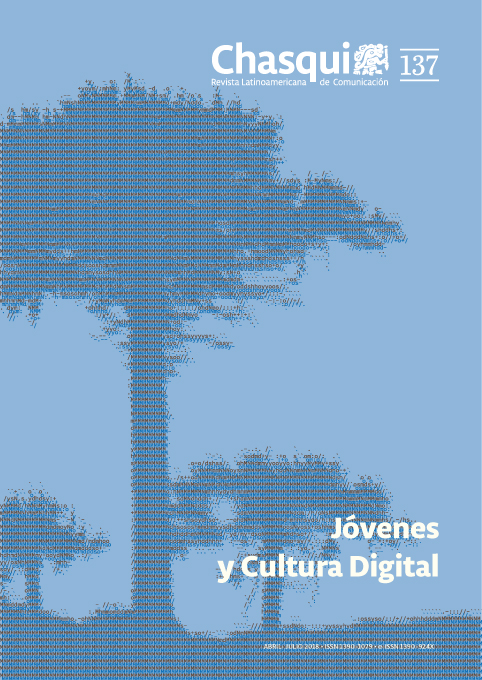Transmedia Literacy in Colombia: Informal learning strategies of young gamers in precarious contexts
DOI:
https://doi.org/10.16921/chasqui.v0i137.3510Keywords:
videogames, participatory culture, informal learning strategiesAbstract
In an environment of convergent devices and narrations, young people are acquiring a set of skills through informal learning strategies developed by their daily contact with technology. Within the frame of an international research project, this study proposes the ethnographic observation of the practices and uses of digital media by students of public schools in Bogota (Colombia). The result is the description and analysis of emergent transmedia learning competences related to videogames, regarded as a form of participatory culture.References
Brandenburger, A., & Nalebuff, B. (1996). Co-opetition. New York: Currency Doubleday.
Castañeda-Peña, H., Salazar-Sierra, A., González-Romero, N., Sierra-Gutiérrez, L., & Menéndez-Echavarría, A. L. (2015). Juegos masivos multijugador en línea: arquitecturas, identidades e hipermediación. Bogotá, D.C.: Pontificia Universidad Javeriana.
Conlon, T. (2004). A review of informal learning literature, theory and implications for practice in developing global professional competence. Journal of European Industrial Training, 28(2/3/4), 283-295. https://doi.org/10.1108/03090590410527663
Couldry, N. (2004). Theorising media as a practice. Social semiotics, 14(2), 115-132. doi:https://doi.org/10.1080/1035033042000238295
Departamento Administrativo Nacional de Estadística [DANE]. (s.f.). Recuperado de Estratificación socioeconómica para servicios públicos domiciliarios: http://www.dane.gov.co/index.php/servicios-al-ciudadano/servicios-de-informacion/estratificacion-socioeconomica#generalidades
Gros Salvat, B. (2009). Certezas e interrogantes acerca del uso de los videojuegos para el aprendizaje. Comunicación, 1(7), 251-264. Recuperado de http://www.revistacomunicacion.org/pdf/n7/articulos/a17_Certezas_e_interrogantes_acerca_del_uso_de%20_los_videojuegos_para_el_aprendizaje.pdf
Hartley, J. (2009). Uses of YouTube - Digital Literacy and the Growth of Knowledge. En J. Burgess, & J. Green, YouTube. Online video and participatory culture (pp. 126-143). Cambridge: Polity Press.
Jenkins, H. (2010). Convergence Culture. Where old and new media collide. Nueva York: New York University Press.
Jenkins, H., Clinton, K., Purushotma, R., Robison, A., & Weigel, M. (2006). Confronting challenges of participatory culture: Media education for the 21st century. Chicago: MacArthur Foundation. Recuperado de http://digitallearning.macfound.org/
Jordan, B. (2012). Advancing ethnography in corporate environments: challenges and emerging opportunities. Walnut Creek: Left Coast Press.
Knowles, M. (1950). Informal adult education. New York: Association Press.
Kraidy, M., & Murphy, P. (2004). Global media studies: an ethnographic perspective. Londres: Routledge.
Leander, K. (2008). Towards a connective ethnography of online/offline literacy networks. En J. Coiro, M. Knobel, C. Lankshear, & D. J. Leu (Eds.), Handbook of research on new literacies (pp. 33-65). Nueva York: Taylor & Francis.
LeCompte, M., & Preissle, J. (1993). Ethnography and qualitative design in educational research. San Diego: Academic Press.
Marsick, V., & Volpe, M. (1999). The nature of and need for informal learning. En V. Marsick, & M. Volpe (Eds.), Informal learning on the job, advances in developing human resources. San Francisco: Berrett Koehler.
Marsick, V., & Watkins, K. (1990). Informal and incidental learning in the workplace. Londres & Nueva York: Routledge.
Ministerio de Educación Nacional de Colombia. (2010, agosto 06). Pruebas Saber. Recuperado de http://www.mineducacion.gov.co/1759/w3-article-244735.html
Organización de las Naciones Unidas para la Educación, l. C. (1998). Conferencia mundial para la educación superior: la educación superior en el siglo XX. Visión y acciones. París: UNESCO. Recuperado de http://unesdoc.unesco.org/images/0011/001163/116345s.pdf
Scolari, C. (2017). D4.2 – Final report on transmedia skills and informal learning strategies. Copia en posesión del autor.
Scribner, S., & Cole, M. (1982). Consecuencias cognitivas de la educación formal e informal. Infancia y aprendizaje, 5(17), 3-18. doi:10.1080/02103702.1982.10821923
Serres, M. (2013). Pulgarcita. Buenos Aires: Fondo de Cultura Económica.
Strauss, A., & Corbin, J. (2002). Bases de la investigación cualitativa. Técnicas y procedimiento para desarrollar la teoría fundamentada. Medellín: Universidad de Antioquia.
Street , B. (2014). Social literacies: critical approaches to literacy in development, ethnography and education. Londres: Routledge.
Tellez, P., Pérez, D., Cala, L., Polo, N., & Rey, G. (2016). Políticas de comunicación y cultura en Colombia. Bogotá: Ministerio de Cultura.
Toffler, A. (1981). La tercera ola. Bogotá: Círculo de lectores.
Valdivia, A., Herrera, M., & Guerrero , M. (2015). Aprendizaje y producción mediática digital en la escuela: un abordaje etnográfico del aprendizaje como práctica cultural en artes visuales. Estudios Pedagógicos(41), 231-251.
Wilson, C., Grizzle, A., Tuazon, R., Akyempong, K., & Cheung, C. (2011). Alfaberización mediática e informacional: curriculum para profesores. París: UNESCO. Recuperado de http://unesdoc.unesco.org/images/0021/002160/216099S.pdf
Winocur, R. (2016). Tensiones generacionales mediadas por las pantallas. En S. Corona, Diálogos educativos dentro y fuera del aula (pp. 271-284). Guadalajara: Universidad de Guadalajara.
Wolcott, H. (1997). Ethnographic research in education. En R. Jagger, Complementary methods for research in education (pp. 327-353). Londres: Routhledge.
Downloads
Published
Issue
Section
License
- Authors retain copyright and grant the journal right of first publication with the work simultaneously licensed under a Creative Commons Attribution-NoDerivs License (CC BY-ND) that allows others to share the work with an acknowledgement of the work's authorship and initial publication in this journal.
- Authors are able to enter into separate, additional contractual arrangements for the non-exclusive distribution of the journal's published version of the work (e.g., post it to an institutional repository or publish it in a book), with an acknowledgement of its initial publication in this journal.
- Authors are permitted and encouraged to post their work online.

